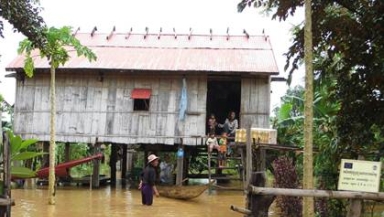
Over a hundred thousand people have been displaced by deadly monsoon floods in Cambodia.
The heavy rains and flash floods have claimed at least 168 lives and affected 20 out of the country's 24 provinces, including parts of capital Phnom Penh.
There are fears of food shortages after the flooding destroyed around 244,000 hectares of rice fields, Christian Aid said.
The development agency is supporting the distribution of food, hygiene kits and tarpaulin shelter to over 3,000 people affected by the floods in the north-eastern province of Ratanakiri.
Christian Aid is working in partnership with Dan Church Aid, which has released £115,000 towards the provision of jerry cans, water purification tablets, and soap to reduce the risk of waterborne diseases like dengue fever and diarrhea.
The emergency aid will be used to help the most vulnerable, including extremely poor female-headed households, widows, migrant landless farmers, people living with HIV, and the elderly.
Long-term recovery will be aided by unconditional cash grants for farmers to buy new seeds and fertiliser, or repay loans.
Christian Aid and Dan Church Aid said they would continue to work long-term with local authorities and communities to increase resilience to natural disasters. This includes building stronger houses and improving early warning and evacuation systems.
Kristen Rasmussen, Dan Church Aid programme coordinator said poor communities were the worst affected by Cambodia's annual monsoon rains.
She said: "After the water levels recede it is the poor farmers and landless migrant workers who will suffer. Cambodians are highly vulnerable to disasters, as many as quarter of them live below the poverty line relying on one agricultural harvest per year. So when the harvest is lost the impact is severe. Many are likely to go into debt to cope with the loss of income.
"We are assessing longer term needs and are purchasing seeds and other agricultural material as well as offering cash grants to vulnerable families. Our experience in the country shows that cash grants work well, especially when distributed to female family members who ensure the money is spent helping the family get back on its feet."













